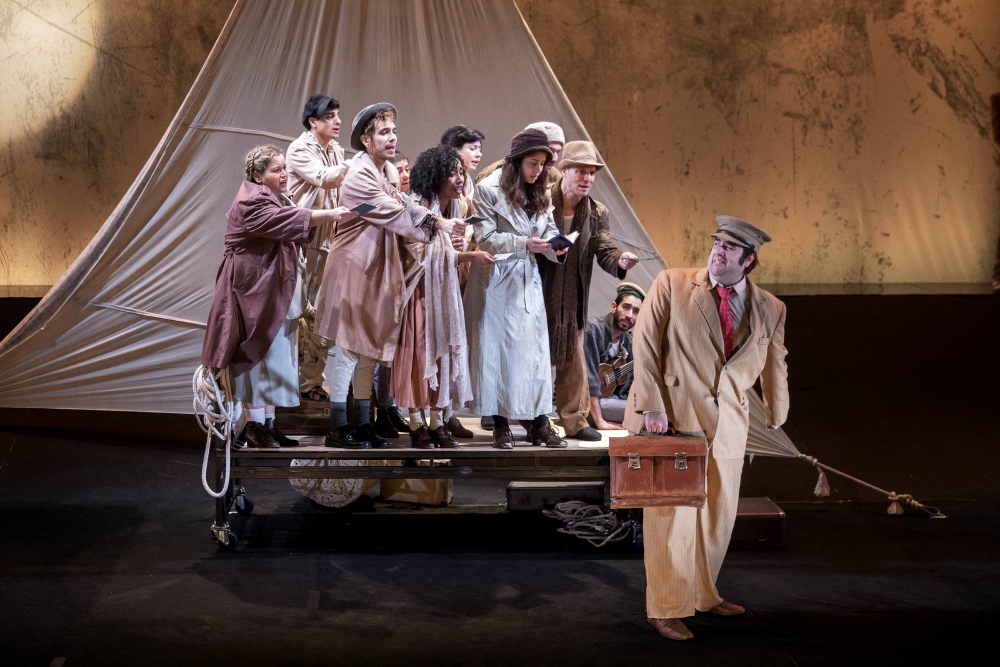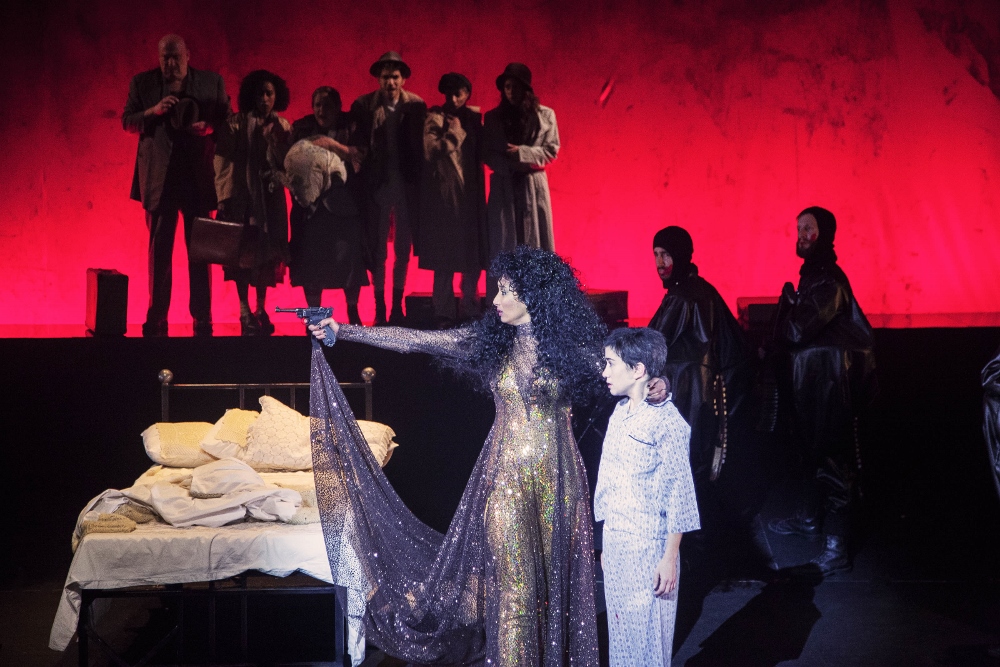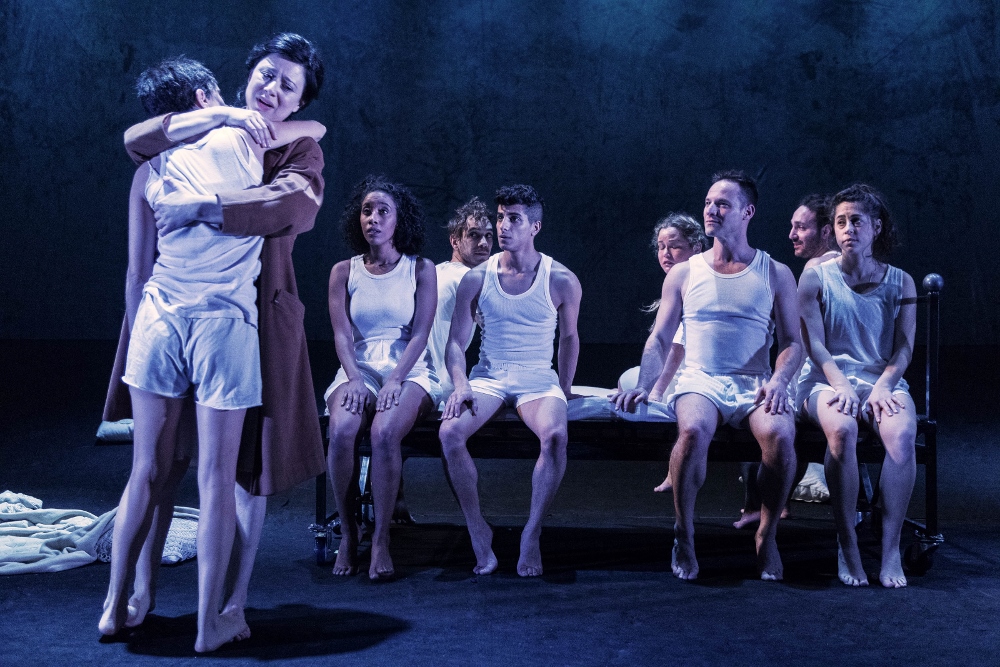
Hanoch Levin’s play, The Child Dreams, takes the viewer on a heart-rending journey, made all the more powerful by the exquisite beauty of this co-production of the Cameri Theatre with Habima National Theatre. Directed with sensitivity and a profound aesthetic sensibility by Omri Nitzan, the play evokes one of the deepest expressions of human capacity for love, compassion, and self-sacrifice – the love of a parent for a child, set against the cruelty and indifference of the world.

Levin’s play was originally inspired by an historic event: the voyage of the St. Louis, a vessel that set sail from Hamburg to Cuba, on May 13, 1936, following the violence of Kristallnacht. The refugees were denied entry to Cuba. They then attempted to find refuge in other ports, but were denied entry to the United States and Canada. Sailing back to Europe, the refugees were accepted in several countries, yet ultimately, many perished in the Nazi concentration camps of WWII. Although the plight of these refugees informs the narrative frame, Levin’s play transcends historic documentation to make a more universal statement on the human condition.
The play opens with a mother (Ola Schur-Selektar) and father (Ben Yosipovich) watching over their sleeping child (Naama Chetrit). Hanoch Levin’s texts, precise and poetic, accompanied by Joseph Bardanashvili’s music in the background, evoke the intimacy, vulnerability, and beauty of this moment. The child slumbers under the loving eye of his parents, guardians of his sleep, and his happiness. It is the very image of love, the safest harbor. Yet this moment is almost instantly shattered, as a nightmarish reality intrudes. The music turns ominous, and the walls of the home literally open to let in a ragged group of refugees, followed by soldiers with guns. It’s Levin’s warning note to anyone who feels safe and warm in their bubble: the sorrows and evils of the world can burst in at any moment.

Bardanashvili’s music not only sets the mood and tone, but, along with the excellent quality of all aspects of this production, is a constant reminder of the human capacity for creativity and grace. All this in stark contrast to the surreal nightmare that interrupts the child’s idyllic life. The structure of the play is somewhat reminiscent of Greek tragedy, thematically, and in the strength of its formal elements, yet there is no catharsis. Levin depicts a world in which death is not redeemed by a sense of fate, meaning, or purpose.

Fortunately for the viewer, director Omri Nitzan offers solace in the art of this production, with its moments of humor, imaginative staging and lively movement, evocative set, and superlative performances. Naaman Chetrit gives an outstanding performance as the child. Her lovely voice rings authentic throughout, evoking an endearing innocence, without ever lapsing into melodrama. Ola Schur Selektar delivers a moving performance as the Mother, Norman Issa is impressive as the Captain hardened by life, Ruth Asrsai is captivating and deadly as the Woman Born for Love. Eran Sarel’s jealous man, Oshrat Ingedashet’s compassionate refugee and lovely singing voice – there are so many memorable moments in this production. One of the most poignant images is created by the small soft lights (Lighting design by Keren Granek) hovering over the dead children – each light a reminder of an innocent soul whose life has been taken away.
In the anonymity of the nameless characters, known only by their function – the Mother, the Child, the Captain – there is a sense of universality. They could be anyone. They could be me and you; their suffering is our suffering.
The Child Dreams
By Hanoch Levin
Directed by Omri Nitzan; Original Music: Joseph Bardanashvili; Set and Costumes: Polina Adamov; Movement: Miri Lazar; Lighting: Keren Granek; Musical Director, Sampler and Piano: Ohad Ben Avi; Assistant Director: Ron Glick, Rotem Carmeli; Cast: Ola Schur-Selektar, Naama Chetrit, Norman Issa, Ruth Asrsai, Ben Yosipovich, Asaf Peri, Alexander Krul, Shahar Raz, Shlomi Avraham, Eran Sarel, Oshrat Ingedashet, Nimrod Dagan, Hadar Baruch, Ronny Merhavi, Raviv Madar, Neil Mishan, Ziv Klayer, Ido Homski Malaach, Eliad Sudai, Ron Glick.





